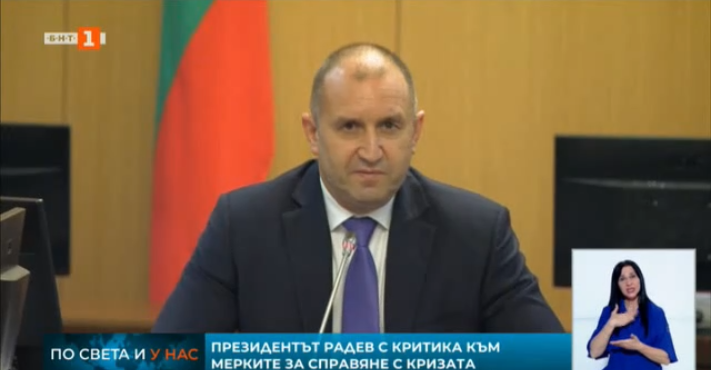Bulgaria’s President Rumen Radev criticised the social and economic measures adopted so far by the government to deal with the consequences of the COVID-19 crisis.
According to him, they are not sufficient and poor people will be hardest hit by the crisis. Economists, lawyers and sociologists, who attended a round table under the patronage of the head of state, also united around this thesis.
It is still too early to assess the results of the socio-economic measures taken so far by the state to deal with the crisis, said President Rumen Radev. According to him, however, it is clear that the measures taken are neither timely, nor accessible to the most needy, nor gratuitous.
Rumen Radev, President of Bulgaria: You can see that Bulgarians are coming out of the state of hypnosis after the panic and are increasingly wondering what really happened. The lack of adequate measures confronts us with a much deeper problem than restoring interrupted production and services, and that is the deepening of poverty and inequality, where we are already European champions.
The President and economists were firm that the poor would suffer the most from this crisis.
Rumen Radev, President of Bulgaria: If the most needy are offered loans and not aid, the state loses its meaning as a support for its citizens in a difficult time.
Atanas Pekanov, economist: The most affected groups will be those who have some kind of part-time jobs, withuncertain work, young people who are often not on permanent contracts, as well as poorer groups.
Economists predict that if more adequate measures are not found, inequality in society will not only continue but will deepen. According to sociologists' estimates, the losses per household due to the crisis are around BGN 1,000 per month, and the aid is insufficient to cover it. The 60/40 measure (for sharing the cost of staff salaries between the state and employers) is also ineffective.
According to Rumen Radev, a solution would be to create entirely new measures and speed up aid, especially for households. He also called for more transparency in spending.
The President personally explained his motives for referring to the Constitutional Court over the latest amendments to the Health Act, which regulate the epidemic situation introduced after the end of the state of emergency.
Rumen Radev, President of Bulgaria: The rights of Bulgarian citizens, which are constitutionally delegated to be given by the National Assembly, have been transferred to the Council of Ministers, and even more so the Council of Ministers acquires rights to restrict the rights of Bulgarian citizens by unclear criteria.
According to Radev, the solution to the crisis will be the implementation of reforms, as well as the creation of conditions for greater and sustainable growth of the Bulgarian economy, which the president called revival.






 Чуй новините
Чуй новините Подкаст
Подкаст






















